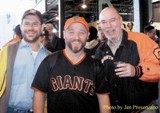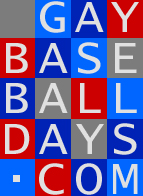 While LGBT fans of major-league baseball have been going to games for decades, only in the past few years have special event organizers for teams begun to acknowledge these fans. Is the trend a statement of acceptance, or simply a form of target marketing?
While LGBT fans of major-league baseball have been going to games for decades, only in the past few years have special event organizers for teams begun to acknowledge these fans. Is the trend a statement of acceptance, or simply a form of target marketing?
According to an August 2004 New York Daily News article, nearly half of baseball’s 30 franchises have hosted gay-related events at home games since 2001, including the Chicago White Sox, Philadelphia Phillies, the Texas Rangers, and the Pittsburgh Pirates, who each held events at their home games.
A recently aired episode of Queer Eye for the Straight Guy included a makeover of the World Series-winning Red Sox. While not an official “Gay Day,” it brought celebrities into the sport. In between the campy jokes and the openly gay consultants throwing out the first ball, player Johnny Damon had some encouraging words.
“If there’s a gay guy in baseball, we have to help him out,” Damon said in a San Francisco Chronicle interview. “I’d smack him on the butt, just like I do everybody else.”
Additionally, when Cincinnati Reds relief pitcher Joe Valentine revealed that he has lesbian parents, the responses were either overwhelmingly positive or just indifferent.
However, official Gay Day events are more often the brainchild of gay male fans, and not created from the team’s promotions staff or by TV networks.
Mark Kari is one of an increasing number of gay baseball fans taking the steps to make such events happen. Kari was inspired by a 2002 Toronto Blue Jays event honoring fellow Japanese-Canadians. The veteran baseball players on the Asahi team had been sent to Canadian internment camps during World War II, but persevered and kept playing in the camps and also after their release.
“Just as I felt proud as the Blue Jays presented these honorable Canadians,” he says, “I thought that I would feel proud, too, if the Jays presented gay and lesbian heroes.”
So, in 2003, Kari contacted the Toronto team about having a Gay Day. In early 2004, he created a website (www.gaybaseballdays.com) as a way to promote the Blue Jays’ Pride Night, and to provide information about other events. This year’s second annual Pride Night, held June 23, included openly gay comic actor Scott Thompson as part of the festivities.
“The more public awareness of these events, the better,” says Kari. “If people realize that almost half the major-league baseball teams have had such events, they will be encouraged to approach their team about something similar. And teams themselves may feel less wary about having an event if they know many others have done them with positive results.”
When San Franciscan Carl Stein noticed a (straight) Singles Night listed among the Giants’ special events in 2004, he contacted the staff about doing a similar event for the local LGBT community.
“They responded very positively, enthusiastically, and quickly,” said Stein. The first event in 2004 had more than 100 gay and lesbian singles (and couples) in attendance. The second event, held in late May 2005, saw more than 250 tickets sold.
Yet unlike other targeted groups who bought group tickets that day, the LGBT group did not receive a perfunctory mention on the stadium’s scoreboard – something that irked Stein, who is a passionate baseball fan.
Like the Giants, the Oakland A’s and the Florida Marlins have held AIDS fundraiser nights for many years, making for default gay-friendly games. The Giants’ “Until There’s a Cure Day” has so far raised over $1 million, with a percentage of ticket sales going to local charities.
But producing a LGBT-specific promotion is not necessarily an endorsement of a particular community. Only two days after the first Gay Day, the Giants advertised a Christian Fellowship Night.
Some gay events – like a 2003 Rangers game in Dallas – endured protests. Three hundred Christian fundamentalists – a third of whom drove 180 miles just to protest gay people attending the baseball game – declared a “victory” when they outnumbered the gay ticket buyers.
Toronto’s Kari says he thinks Gay Days are simply about filling seats with fans. “Initially, it’s about money and being politically correct,” says Kari. “If a group approaches a team and says ‘We want to buy 500 tickets,’ how can they say no? If they did say no, they would be seen as discriminating against the LGBT community.”
Kari sees changes from last year, when the Red Sox didn’t publicly acknowledge their first gay event, to this year’s highly publicized Queer Eye game.
And although the openly gay presence in baseball remains limited to a few celebrities and many fans, Kari sees it as a form of progress. “It’s not a big deal anymore – gay moms, gay dads, gay brothers, gay friends,” he says. “As these stories come out, there will be less fear for the general public, and [it will] make things easier for a player to come out, too.”
